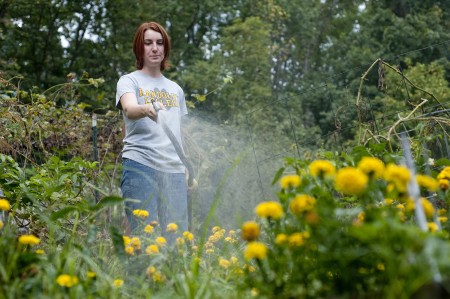National Wildlife Federation publication touts Randolph’s ‘lands-on’ experiences for students
 LYNCHBURG – Randolph College is the only higher education institution in Virginia featured in the National Wildlife Federation’s (NWF) The Campus Wild: How College and University Green Landscapes Provide Havens for Wildlife and “Lands-on” Experiences for Students, which was released this week.
LYNCHBURG – Randolph College is the only higher education institution in Virginia featured in the National Wildlife Federation’s (NWF) The Campus Wild: How College and University Green Landscapes Provide Havens for Wildlife and “Lands-on” Experiences for Students, which was released this week.
The richly detailed guide highlights how colleges and universities are playing a dynamic role protecting wildlife and restoring habitats in campus green spaces—including on-campus landscapes and natural areas, as well as distant campus-owned lands. It explores how such green places—dedicated to “The Wild”—also can benefit students, faculty, and staff with leadership opportunities, hands-on learning, energy savings, water conservation, and much more.
The guide highlights 85 higher education institutions, representing all 50 states including the District of Columbia, and showcases a variety of habitat-related projects from diverse regions across the U.S.
“Being the only Virginia institution to be featured in this publication is a wonderful testament of the work the College is doing to provide a wholesome education to its student body,” said Ludovic Lemaitre ’11. Randolph’s sustainability coordinator. “We don’t just teach. We provide a high quality environment for our students that allows them to learn by doing, and I am thrilled that the National Wildlife Federation is recognizing this aspect of our campus.”
Randolph was recognized for its Organic Garden and the accompanying apple orchard, edible landscaping nursery, and food forest as well as the flock of chickens, rainwater retention pond, and honeybees that can be found on the 1-acre plot of land. The guide points out Randolph students’ involvement with the project as volunteers, and the gardens use in conjunction with biology and other outdoor classroom lessons.
The article featured Lemaitre, who was quoted as saying, “I want the gardens to be places where people can come to learn about edible landscaping. They will provide a service to the community and wildlife and be places where students can learn how to propagate these plants.”
In 2013-14, the NWF awarded Lemaitre an Emerging Leader Fellowship to establish a new 600-square-foot edible perennials nursery for the greater Lynchburg community. It contains American chestnut, pawpaw, beechnut, native grape, and many other plants.
More than half of the 4,600 schools in the U.S. have participated in Campus Ecology projects that have created wildlife habitat, increased biodiversity and reduced greenhouse gas emissions. Campuses are “perfect environments for nurturing wildlife while providing outdoor, living laboratories for students,” says Courtney Cochran, coauthor of the guide and NWF’s Campus Ecology senior coordinator.
The Organic Garden is one of many projects and initiatives in Randolph’s focus on sustainability. The College recently received a national award from Purposeful Networks for its recycling efforts, and earlier this summer the Princeton Review named Randolph one of the top 50 green colleges in the nation.
For more information on sustainability efforts at Randolph College, visit http://www.randolphcollege.edu/sustainability/
Tags: environmental studies, environmental sustainability, Green Colleges, Ludovic Lemaitre, national recognitions, sustainability
